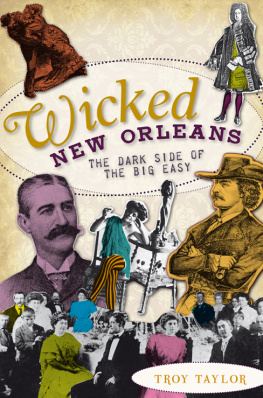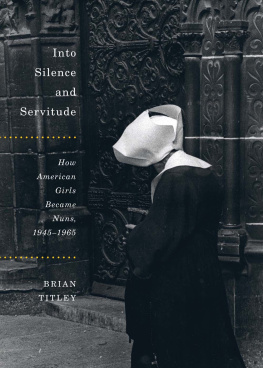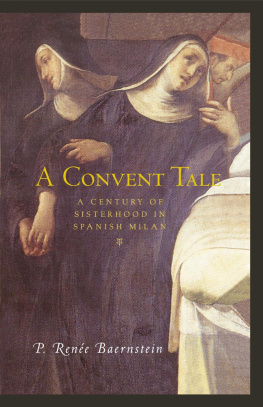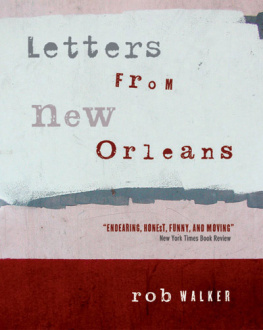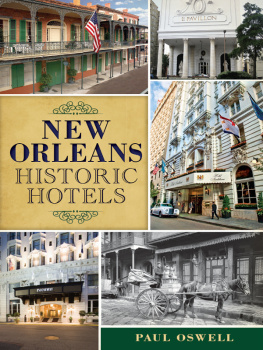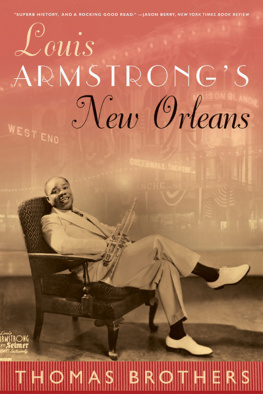VOICES FROM AN EARLY AMERICAN CONVENT
VOICES FROM
AN EARLY AMERICAN
CONVENT
Marie Madeleine Hachard and
the New Orleans Ursulines,
17271760
EDITED BY EMILY CLARK
Published by Louisiana State University Press
Copyright 2007 by Louisiana State University Press
All rights reserved
Manufactured in the United States of America
Louisiana paperback edition, 2009
DESIGNER: Melanie OQuinn Samaha
TYPEFACE: Adobe Garamond Pro
TYPESETTER: G&S Typesetters, Inc.
LIBRARY OF CONGRESS CATALOGING-IN-PUBLICATION DATA
Hachard, Marie-Madeleine, d. 1760.
[Relation du voyage des dames religieuses Ursulines de Rouen la Nouvelle-
Orlans. English]
Voices from an early American convent : Marie Madeleine Hachard and the
New Orleans Ursulines, 17271760 / edited by Emily Clark.
p. cm.
Includes index.
ISBN-13: 978-0-8071-3237-1 (cloth : alk. paper)
1. Hachard, Marie-Madeleine, d. 1760Correspondence. 2. Ursulines of New Orleans (New Orleans, La.)Biography. 3. UrsulinesLouisianaNew OrleansHistory. 4. New Orleans (La.)Church history. I. Clark, Emily, 1954 II. Title.
BX4705.H13A413 2007
271.97402dc22
[B]
2006031609
ISBN-13: 978-0-8071-3446-7 (pbk.)
The paper in this book meets the guidelines for permanence
and durability of the Committee on Production Guidelines for
Book Longevity of the Council on Library Resources.
CONTENTS
PART 1
Letters of Marie Madeleine Hachard
PART 2
Obituary Letters
PART 3
Procession Account
Appendix
Publication History of Hachards Letters
ACKNOWLEDGMENTS
This book represents the contributions of many people, my own the least among them. Five eighteenth-century Ursuline nuns first committed to paper the words that constitute the substance of this volume. My largest debt is to these extraordinary chroniclers of a largely unknown chapter in early American womanhood: Marie Madeleine Hachard, Marie Tranchepain, Marguerite Judde, Marguerite Bernard de St. Martin, and Perinne Elizabeth Bellaire. Two gifted linguists, Maria Dolores Hernandez, O.S.U., and Jane Frances Heaney, O.S.U, both now deceased, crafted excellent translations of Hachards letters and of the procession account of 1734. Heaneys translation of the procession account is reprinted here verbatim as it was published in her monograph, A Century of Pioneering: A History of the Ursuline Nuns in New Orleans, 17271827, edited by Mary Ethel Booker Siefken and published in 1993 by the Ursuline Sisters of New Orleans. I substantially edited Hernandezs manuscript translation, but the work remains largely hers. The Ursuline Sisters of New Orleans hold the copyright to both translations, and I am grateful to them for allowing me to use them as the foundation for this volume. This project developed over a rather long period of time, during which three different prioresses of the Ursuline Sisters of New Orleans gave me their support in both formal and informal ways. It is my pleasure to thank Esther Redman, O.S.U.; Carla Dolce, O.S.U.; and Carolyn Marie Brockland, O.S.U. The Archives Nationales de France, Historic New Orleans Collection, Newberry Library, and New York Public Library generously granted permission to reproduce maps and illustrations in their collections.
As a historian, I took on the role of translator and editor with no small trepidation. I thank Mary Laven and Peter Bailey at the University of Cambridge for good counsel and encouragement, and especially the anonymous reader for the Press, who helped me give Marie Hachard and her sisters in religion the introductions they deserved. Sophie White at the University of Notre Dame helped me decipher some particularly tricky passages in badly deteriorated manuscripts. The editorial staff at Louisiana State University Press has been wonderfully supportive of this project from its inception. I especially thank Rand Dotson and Cynthia Williams for shepherding the manuscript so expertly through the publication process. Any faults that remain are mine alone.
Sylvia Frey, Michael Kane, Joan Kay, Diana Pinckley, John Pope, and Marianne Wafer have always been willing to hear my stories about the Ursulines and have helped me to see them in new ways. I thank Ron Biava for his love and his insistence that Hurricane Katrina not be allowed to derail this project.
My biggest debt to a living Ursuline is to Joan Marie Aycock, O.S.U., archivist for the New Orleans Ursulines, to whom I owe my acquaintance with her colonial predecessors. When she gave me access to the manuscript materials held in her communitys private archives, she opened a door onto a largely hidden past filled with treasures for scholars and students of the history of women, religion, and race. She also introduced me, with warmth and humor, to the contemporary world of convent and nun, a place far stranger than the eighteenth century for the inexperienced non-Catholic who turned up at her archive door a decade ago. I am happy that the publication of this volume gives me an opportunity to thank her publicly for turning the key in the convent gate and inviting me in to look around.
VOICES FROM AN EARLY AMERICAN CONVENT
INTRODUCTION
THE DOCUMENTS
On a February day in 1727 a genteel young Frenchwoman was hauled unceremoniously by rope and pulley up the side of a sailing ship anchored in the harbor of the French port of Lorient to join an intrepid band of missionaries and colonists bound for Louisiana. At twenty years of age she was the youngest of twelve Ursuline nuns who were turning their backs on the predictable comforts of religious life in France to answer Gods call to labor in the wilderness of the Lower Mississippi Valley. The young womans name was Marie Madeleine Hachard. Because she was not yet a fully professed nun when she set out on her adventure, she had the freedom to maintain contact with her biological family. A dutiful daughter, she took advantage of that liberty to write a series of five letters to her father, Jacques Hachard, an official in the bureau of accounts in Rouen.
Marie Madeleine Hachards letters describe the young nuns journey from the bosom of her family to the shores of the Mississippi in an unaffected voice suffused with equal measures of excitement and religious idealism. Her letters regale us with narratives of adventure and the exotic from a perspective rare in eighteenth-century sources. Hachards gender and her youth render her richly detailed account distinctive. She casts a keen eye over features of the environment and human nature that did not attract the attention of the official male voices that dominate the historical record for colonial Louisiana, offering a fresh perspective that makes for compelling reading.
Hachards letters were originally published by her father in her hometown of Rouen in 1728 under the title Relation du voyage des dames religieuses Ursulines (Relation of the voyage of the Ursuline nuns). Several other French editions appeared in the nineteenth and twentieth centuries. It was not until 1974 that an English translation of all five letters appeared in book form, privately published in a small run. The sporadic publication of the letters and their limited availability in English have left them mostly unknown to the American readers who constitute their natural audience today. This new translated edition of Hachards letters is intended to make this engaging source widely available to English-speaking students and historians.


